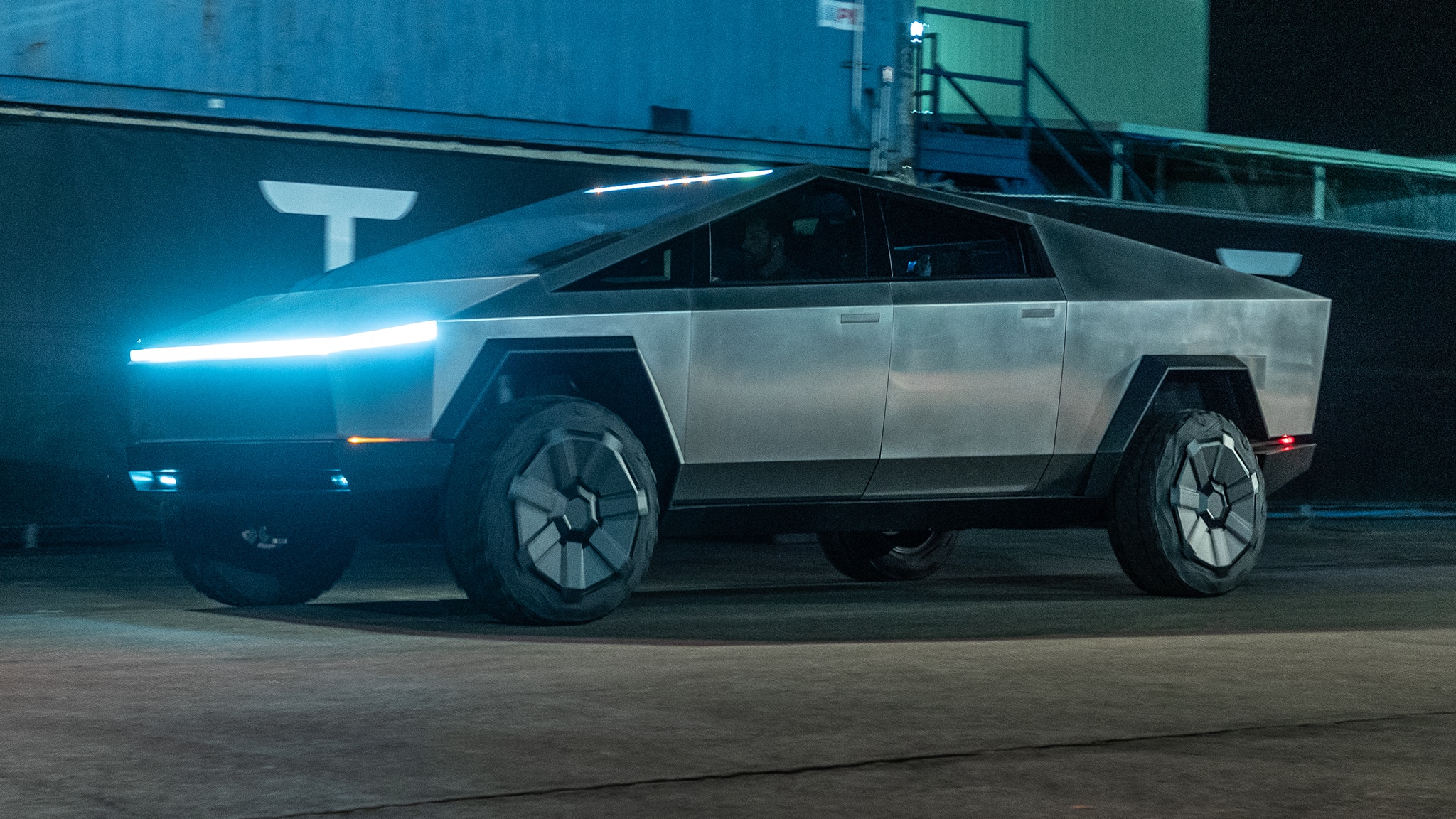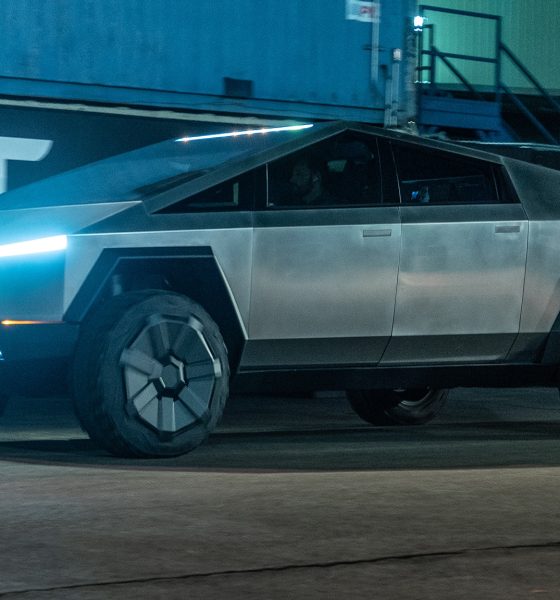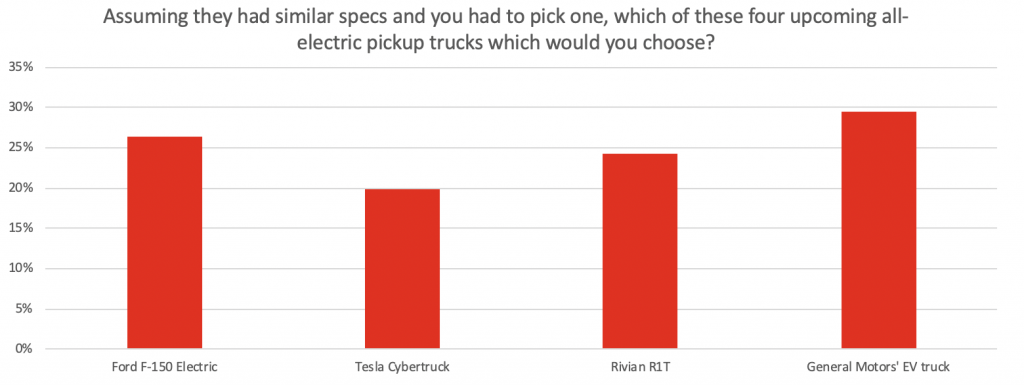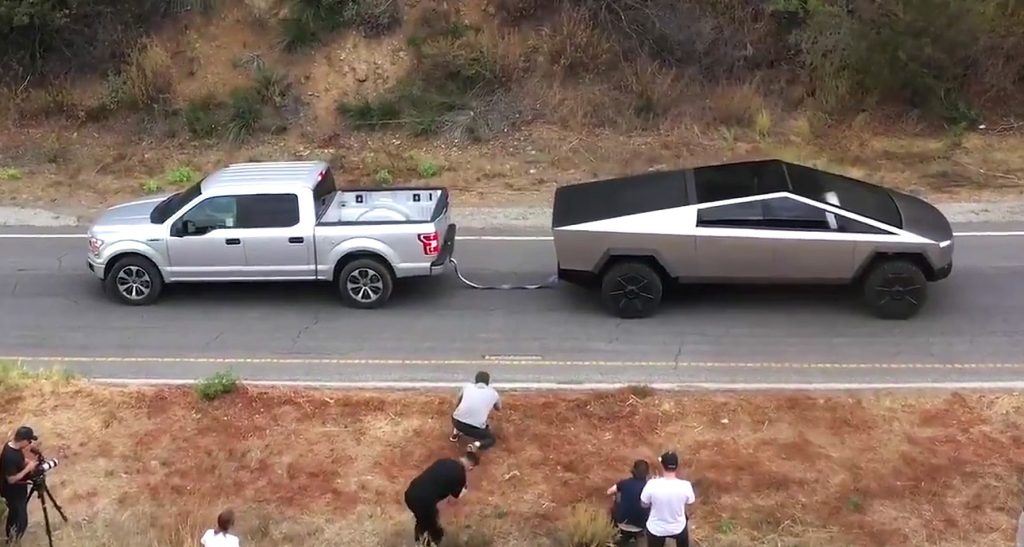

News
Tesla Cybertruck comes in dead last against GM, Ford and Rivian in consumer survey
A recent consumer survey comparing the Tesla Cybertruck to the Ford F-150 Electric, the Rivian R1T, and GM’s unreleased, unannounced electric pickup truck has rendered rather interesting results. Based on the results of the study, which was conducted by Autolist.com, it appears that consumers prefer EV trucks over incumbents like GM and Ford. Consumers specifically mentioned their preference for Rivian and Tesla vehicles. The Cybertruck, with its radical styling, ended up ranking dead last in the survey’s overall rankings.
Among the respondents of Autolist.com’s survey, 50% have never owned a pickup before, while 49% have owned or currently own a truck. One percent of the study’s respondents stated that they were “unsure.” Around ~1,100 respondents were selected for the study between late November and early December, with each one being asked which all-electric pickup they prefer and why.
Interestingly, GM’s unannounced, unconfirmed all-electric pickup was the respondents’ top choice, with the still-unknown vehicle grabbing 29% of the vote. The Ford F-150 Electric came in second with 27% of the vote, while the Rivian R1T came in at a respectable third place with 24%. At the bottom was the Tesla Cybertruck, which was deemed as the top EV pickup choice by 20% of respondents.

While the overall results of the consumer survey seem unfavorable to the Tesla Cybertruck, a look at the study’s detailed results shows something very notable about the upcoming vehicle. Respondents in the survey were asked to pick three reasons why they selected a particular all-electric truck. The reasons selected for the Cybertruck by the respondents were notably different compared to the other vehicles in the survey.
For GM’s unannounced electric pickup, 62% of respondents listed their trust in the GM brand as their reason behind their preference, while 41% listed the expected reliability of the upcoming vehicle. The expected performance of the truck was listed by 37% of respondents as a priority as well. These results mirror that of the Ford F-150 Electric, with respondents’ trust in the Ford brand receiving 54% of the votes, expected reliability getting 52%, and expected performance getting 38%.
These results are very different compared to those gathered for the Rivian R1T and Tesla Cybertruck. For the R1T, it appears that its exterior styling is its biggest draw, as shown by 75% of respondents listing its look as a reason why they would choose the vehicle. Expected vehicle size and performance both were listed by 35% of respondents, and expected practicality and features received 30% of the vote.

In this sense, the Cybertruck’s results are a league of their own, with respondents seemingly prioritizing the vehicle’s entire ecosystem and Tesla’s classic performance. Fifty percent of respondents listed the Cybertruck’s expected performance as a reason they would choose the vehicle, while expected efficiency and Autopilot received a nod from 44% of respondents. Tesla’s Supercharger Network was also listed by 29% of respondents. This, if any, shows that those who prefer the Cybertruck are already familiar with EV ownership, as evidenced by their mention of charging infrastructure and advanced driver-assist systems as key priorities.
In a way, these results show that buyers who are considering the Tesla Cybertruck have preferences that do not necessarily mirror that of usual pickup customers. A part of this discrepancy may be due to a notable difference among respondents who have owned a truck and those that have never owned a pickup before. Respondents who have owned pickups before seemed the most averse to the Cybertruck, with 35% choosing GM’s electric truck as their top choice, 28% choosing the F-150 Electric, 23% opting for the Rivian R1T, and only 14% selecting the Cybertruck. Among respondents who were non-truck owners, the results were flipped, with the Cybertruck being most popular with 25.8% of respondents’ vote, the Rivian R1T getting 24.8%, and the two EV trucks from Ford and GM receiving 24.7% each.
Chase Disher, an analyst at Autolist.com, explained that the results of its survey are actually favorable for all the electric pickups and their respective makers. It shows that the veteran automakers can find a loyal customer base for their all-electric trucks, and it also reveals that an entirely new pickup market could be opened, pushed by vehicles like the Cybertruck. “Frankly, these results are good for all four brands. It shows that Ford and GM can leverage their considerable — and existing — truck followings to boost interest in their EV models. Meanwhile, it shows that Tesla and Rivian could be poised to grab a meaningful share of a crucial new growth segment,” he said.
The full results of Autolist.com’s study could be accessed here.

News
Tesla wins another award critics will absolutely despise
Tesla earned an overall score of 49 percent, up 6 percentage points from the previous year, widening its lead over second-place Ford (45 percent, up 2 points) to a commanding 4-percentage-point gap. The company also excelled in the Fossil Free & Environment category with a 50 percent score, reflecting strong progress in reducing emissions and decarbonizing operations.

Tesla just won another award that critics will absolutely despise, as it has been recognized once again as the company with the most sustainable supply chain.
Tesla has once again proven its critics wrong, securing the number one spot on the 2026 Lead the Charge Auto Supply Chain Leaderboard for the second consecutive year, Lead the Charge rankings show.
NEWS: Tesla ranked 1st on supply chain sustainability in the 2026 Lead the Charge auto/EV supply chain scorecard.
“@Tesla remains the top performing automaker of the Leaderboard for the second year running, and increased its overall score by 6 percentage points, while Ford only… pic.twitter.com/nAgGOIrGFS
— Sawyer Merritt (@SawyerMerritt) March 4, 2026
This independent ranking, produced by a coalition of environmental, human rights, and investor groups including the Sierra Club, Transport & Environment, and others, evaluates 18 major automakers on their efforts to build equitable, sustainable, and fossil-free supply chains for electric vehicles.
Tesla earned an overall score of 49 percent, up 6 percentage points from the previous year, widening its lead over second-place Ford (45 percent, up 2 points) to a commanding 4-percentage-point gap. The company also excelled in the Fossil Free & Environment category with a 50 percent score, reflecting strong progress in reducing emissions and decarbonizing operations.
Perhaps the most impressive achievement came in the batteries subsection, where Tesla posted a massive +20-point jump to reach 51 percent, becoming the first automaker ever to surpass 50 percent in this critical area.
Tesla achieved this milestone through transparency, fully disclosing Scope 3 emissions breakdowns for battery cell production and key materials like lithium, nickel, cobalt, and graphite.
The company also requires suppliers to conduct due diligence aligned with OECD guidelines on responsible sourcing, which it has mentioned in past Impact Reports.
While Tesla leads comfortably in climate and environmental performance, it scores 48 percent in human rights and responsible sourcing, slightly behind Ford’s 49 percent.
The company made notable gains in workers’ rights remedies, but has room to improve on issues like Indigenous Peoples’ rights.
Overall, the leaderboard highlights that a core group of leaders, Tesla, Ford, Volvo, Mercedes, and Volkswagen, are advancing twice as fast as their peers, proving that cleaner, more ethical EV supply chains are not just possible but already underway.
For Tesla detractors who claim EVs aren’t truly green or that the company cuts corners, this recognition from sustainability-focused NGOs delivers a powerful rebuttal.
Tesla’s vertical integration, direct supplier contracts, low-carbon material agreements (like its North American aluminum deal with emissions under 2kg CO₂e per kg), and raw materials reporting continue to set the industry standard.
As the world races toward electrification, Tesla isn’t just building cars; it’s building a more responsible future.
News
Tesla Full Self-Driving likely to expand to yet another Asian country
“We are aiming for implementation in 2026. [We are] doing everything in our power [to achieve this],” Richi Hashimoto, president of Tesla’s Japanese subsidiary, said.

Tesla Full Self-Driving is likely to expand to yet another Asian country, as one country seems primed for the suite to head to it for the first time.
The launch of Full Self-Driving in yet another country this year would be a major breakthrough for Tesla as it continues to expand the driver-assistance program across the world. Bureaucratic red tape has held up a lot of its efforts, but things are looking up in some regions.
Tesla is poised to transform Japan’s roads with Full Self-Driving (FSD) technology by 2026.
Richi Hashimoto, president of Tesla’s Japanese subsidiary, announced the ambitious timeline, building on successful employee test drives that began in 2025 and earned positive media reviews. Test drives, initially limited to the Model 3 since August 2025, expanded to the Model Y on March 5.
Once regulators approve, Over-the-Air (OTA) software updates could activate FSD across roughly 40,000 Teslas already on Japanese roads. Japan’s orderly traffic and strict safety culture make it an ideal testing ground for autonomous driving.
Hashimoto said:
“We are aiming for implementation in 2026. [We are] doing everything in our power [to achieve this].”
The push aligns with Hashimoto’s leadership, which has been credited for Tesla’s sales turnaround.
In 2025, Tesla delivered a record 10,600 vehicles in Japan — a nearly 90% jump from the prior year and the first time exceeding 10,000 units annually.
BREAKING 🇯🇵 FSD IS LIKELY LAUNCHING IN JAPAN IN 2026 🚨
Richi Hashimoto, President of Tesla’s Japanese subsidiary, stated: “We are aiming for implementation in 2026” and added that they are “doing everything in our power” to achieve this 🔥
Test drives in Japan began in August… pic.twitter.com/jkkrJLszXN
— Ming (@tslaming) March 5, 2026
The strategy shifted from online-only sales to adding 29 physical showrooms in high-traffic malls, plus staff training and attractive financing offers launched in January 2026. Tesla also plans to expand its Supercharger network to over 1,000 points by 2027, boosting accessibility.
This Japanese momentum reflects Tesla’s broader international expansion. In Europe, Giga Berlin produced more than 200,000 vehicles in 2025 despite a temporary halt, supplying over 30 markets with plans for sequential production growth in 2026 and battery cell manufacturing by 2027.
While regional EV sales faced headwinds, the factory remains a cornerstone for Model Y deliveries across the continent.
In Asia, Giga Shanghai continues to be recognized as Tesla’s powerhouse. China, the company’s largest market, saw January 2026 deliveries from the plant rise 9 percent year-over-year to 69,129 units, with affordable new models expected later this year.
FSD advancements, already progressing in the U.S. and South Korea, are slated for Europe and further Asian rollout, complementing plans to expand Cybercab and Optimus to new markets as well.
With OTA-enabled autonomy on the horizon and retail strategies paying dividends, Tesla is strengthening its footprint from Tokyo showrooms to Berlin assembly lines and Shanghai exports. As Hashimoto continues to push Tesla forward in Japan, the company’s global vision for sustainable, self-driving mobility gains traction across Europe and Asia.
News
Tesla ships out update that brings massive change to two big features
“This change only updates the name of certain features and text in your vehicle,” the company wrote in Release Notes for the update, “and does not change the way your features behave.”

Tesla has shipped out an update for its vehicles that was caused specifically by a California lawsuit that threatened the company’s ability to sell cars because of how it named its driver assistance suite.
Tesla shipped out Software Update 2026.2.9 starting last week; we received it already, and it only brings a few minor changes, mostly related to how things are referenced.
“This change only updates the name of certain features and text in your vehicle,” the company wrote in Release Notes for the update, “and does not change the way your features behave.”
The following changes came to Tesla vehicles in the update:
- Navigate on Autopilot has now been renamed to Navigate on Autosteer
- FSD Computer has been renamed to AI Computer
Tesla faced a 30-day sales suspension in California after the state’s Department of Motor Vehicles stated the company had to come into compliance regarding the marketing of its automated driving features.
The agency confirmed on February 18 that it had taken a “corrective action” to resolve the issue. That corrective action was renaming certain parts of its ADAS.
Tesla discontinued its standalone Autopilot offering in January and ramped up the marketing of Full Self-Driving Supervised. Tesla had said on X that the issue with naming “was a ‘consumer protection’ order about the use of the term ‘Autopilot’ in a case where not one single customer came forward to say there’s a problem.”
This was a “consumer protection” order about the use of the term “Autopilot” in a case where not one single customer came forward to say there’s a problem.
Sales in California will continue uninterrupted.
— Tesla North America (@tesla_na) December 17, 2025
It is now compliant with the wishes of the California DMV, and we’re all dealing with it now.
This was the first primary dispute over the terminology of Full Self-Driving, but it has undergone some scrutiny at the federal level, as some government officials have claimed the suite has “deceptive” names. Previous Transportation Secretary Pete Buttigieg was one of those federal-level employees who had an issue with the names “Autopilot” and “Full Self-Driving.”
Tesla sued the California DMV over the ruling last week.








